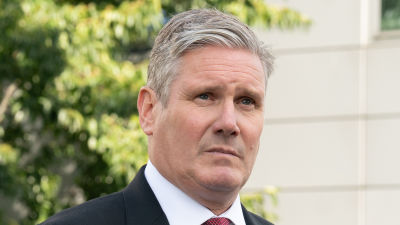Sir Keir Starmer sees halting boat crossings as 'political opportunity' ahead of election

Labour leader Sir Keir Starmer has sought to outline his party's plan to tackle the surging number of migrant crossings - an issue set to dominate the upcoming general election.
He and his shadow home secretary, Yvette Cooper, visited The Hague this week to try to establish a partnership with the European Union's (EU) law enforcement agency, Europol, on illegal migration.
In a series of interviews with The Sun and Times newspapers, Sir Keir also confirmed the party's plan to abolish the government's Rwanda policy, use crime prevention orders to freeze the assets of people smugglers, and signalled a willingness to agree a "returns agreement" with the EU - which could see the UK accept a quota of migrants from the bloc.
Conservatives have been quick to criticise the proposals in heated terms, sparking a war of words between senior government ministers and the opposition.
Home Secretary Suella Braverman has warned the measures would put Brussels in charge of the UK's migration policy, while Immigration Minister Robert Jenrick argued they would see Britain forced to take more than 100,000 illegal migrants from Europe.
In response, Sir Keir described the Tory remarks as "embarrassing".
But underneath the rhetoric, Thursday's announcements are indicative of a Labour party feeling increasingly confident in its domestic and international agenda.
Rishi Sunak has made reducing small boat crossings one of his key pledges to the public, but flagship policies such as the Rwanda scheme and plan to house migrants on the Bibby Stockholm barge have been entangled in legal disputes.
Immigration consistently polls in the top three political priorities for voters, and among Tory MPs I have spoken to in recent weeks, they fear the party will lose the confidence of a vital voter bloc if it fails to make headway on this issue.
With more than 23,000 migrant crossings this year alone, Labour believes it has a political opportunity to prove to voters, particularly in red wall seats, that it can succeed where others are perceived to have failed.
For months, Labour has criticised the government's Brexit deal and delays over schemes, such as Horizon, but had largely avoided making definitive policy promises on the tricky issue of how the UK should define its relationship with Europe post-Brexit.
Sir Keir's support for remaining in the EU and a second referendum under a previous Labour leadership had been frequently weaponised by Tory MPs, looking to portray him as weak on Brexit.
But recent polling has revealed growing public dissatisfaction with the UK's relationship with Europe, with 71% believing that the government has handled Brexit badly.
Sir Keir has been at pains today to stress that his party will not be backing a return to the single market, customs market or freedom of movement.
But it is clear that those at the top of the party believe the public could be open to greater cooperation with Europe if it helps to tackle the thorny issue of migration.
As the Conservative government has found, tough rhetoric and bold promises on migration will grab headlines and media attention, but can prove hard to implement in practice.
The next challenge for Sir Keir will be how Europe reacts to his plans and convincing the public that today's announcements will actually become a political reality.
Want a quick and expert briefing on the biggest news stories? Listen to our latest podcasts to find out What You Need To Know...